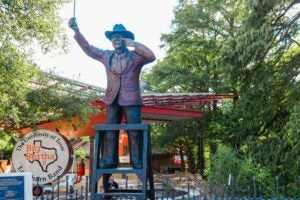The 125th birthday of The University of Texas at Austin is a time to celebrate the many successes of the university, but it also is a time to take stock of challenges, which “are considerable as well,” President William Powers Jr. said Sept. 17, in his President’s State of the University Address to an audience of guests and members of the university community.
Powers, in his third state of the university address since taking office on Feb. 1, 2006, said the challenges would not be overcome in a single year, “but we can and will overcome them.”
“It will take hard work, discipline and perseverance,” Powers said. “All of us, from my office to every department and research unit, will need to think very strategically about how we use our resources.” He said the university must begin to redirect its resources “into the priorities that really matter,” and there is a need to develop new resources.
Powers said he would “continue to tackle our need for more graduate student support” by adding $2 million to the budget for graduate stipends, bringing the annual total to $19 million. He also said he would provide $1,200 per year for travel expenses for faculty members to present original papers at scholarly and professional meetings at a cost of about $2 million a year.
Powers spoke proudly about the university’s many accomplishments “since Dr. John Mallet opened UT’s doors in 1883 to eight professors and 221 students, mostly from farms and small towns within 100 miles of Austin.” He described outstanding accomplishments of faculty members and students who had a stellar year and expressed gratitude to generous donors and the Commission of 125 for their contributions in moving the university forward.
Powers said the university’s challenges include four critical areas identified by the university’s Policy and Planning Advisory Council, which includes leaders representing faculty, students, department chairs, deans, staff and administration. He said the university is substantially behind its competitors in salary and research support packages to attract and retain faculty and trails its competitors in support packages to attract graduate students. Powers said the university needs space to house faculty, teach classes and do research. He also called for a more flexible admissions standard, along with more robust scholarships, to attract and support undergraduate students.
Powers said his focus with legislators for the new session in January will involve three major areas including increased state funding, retaining the University of Texas System Board of Regents’ flexibility to set tuition, and modifying the Top 10 Percent Law for admissions.
“First, we simply cannot compete successfully against the top national research universities without adequate financial support,” Powers said, explaining that the university’s greatest obstacle today is that it is under-funded in comparison to its national peers.
Powers said the university also should seek modification of the state’s Top 10 Percent Law “or we will have a very one-dimensional student body, without students who have exceptional skills not measured by class rank.” He said that this year 81 percent of the Texas residents in the freshman class were automatically admitted under the Top 10 Percent Law.
Powers said diversifying the campus continues to be one of the university’s highest priorities, and he is pleased with the progress. He noted that curriculum reform is well under way on campus, due to the hard work of the deans, the faculty and the academic staff.
“We received $511 million in external research awards, up 26 percent in two years,” he said. “We moved from third to second in the nation in federal funding for universities without medical schools, ahead of Berkeley and Illinois, and trailing only MIT.”
He said this also has been a banner year in fundraising, thanks to the deans and the Development Office.
“It’s no secret that we are planning a capital campaign in the near future,” he said. “Right now, the dimensions of the campaign are not public, at least until later this semester. There will be an announcement very soon. What I can tell you now is that the capital campaign will be big.”



